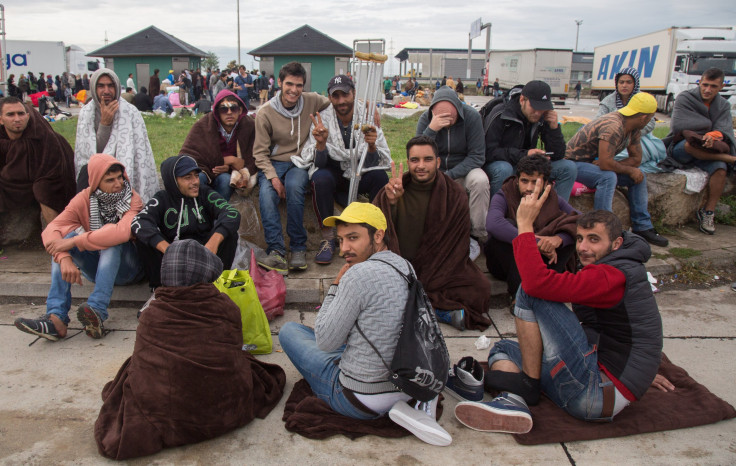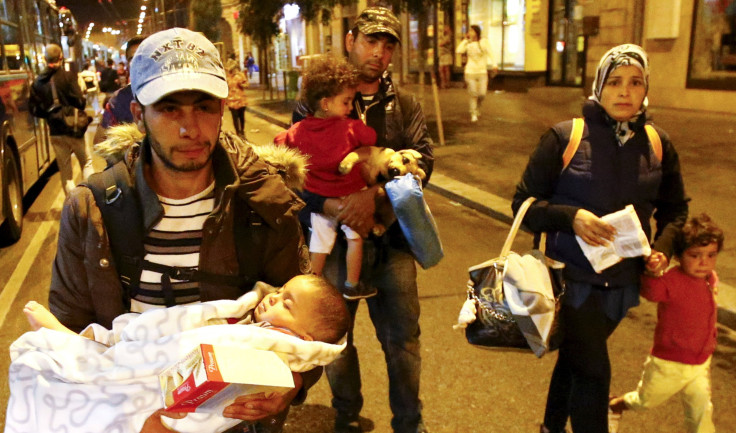European Refugee Crisis: Thousands Arrive In Austria In Buses From Hungary, Germany Expecting Nearly 10,000 Refugees

This story has been updated.
Update: Both Austria and Germany opened their borders Saturday to thousands of refugees who had been staying temporarily in Hungary, according to Reuters. Many of them have been displaced by the Syrian Civil War, as the news agency reported. The Austrian interior minister said about 6,500 of refugees had reached his country, and German police said around 450 of them had traveled aboard a special train from Hungary to Munich.
Original Story:
Thousands of refugees arrived in Austria on Saturday after Hungary provided buses Friday to take them across the border overnight. About 4,000 refugees, who crossed over to the Austrian border, are being received in a Red Cross Center, BBC reported. Over 6,000 more, currently in Hungary, are expected to follow.
Several Austrians waited at the border with refreshments and bedding along with placards that read: “Refugees welcome,” NBC News reported. The development comes after days of unrest in the region that saw thousands of refugees camping outside the main railway station in Hungary’s capital Budapest to get onto trains to Western Europe. Several trains were canceled as the government had initially said that those entering Hungary will be registered and their asylum applications will be processed in accordance with the EU standards. However, Hungary eased the restrictions after many embittered refugees swamped police cordons and set off toward the main highway to Vienna on foot Friday. Most of those who arrived in Austria were Syrians trying to escape violence in their home country.
“This has to be an eye opener about how messed up the situation in Europe is now. I hope that this serves as a wake up call that (the situation) cannot continue. Thank god, the problem could be solved yesterday evening in a humanitarian way. Anyone who believes that you can sit out this problem is wrong,” Austrian Foreign Minister Sebastian Kurz said Saturday, according to the Guardian, referring to the thousands stuck in Hungary a day before.

Austria said Friday that it would allow the migrants access to the country, in agreement with Germany, waiving off the rules of the asylum system to tackle the worst refugee crisis the EU has seen since the Yugoslav wars of 1990s.
Abdullah Baker, a 26-year-old physician from Aleppo, Syria, said, according to NBC News: "My family had tears of joy when I told them about the bus," adding: "We always fear the unknown but I long for closure."
The refugees are now being taken to Vienna from the Austrian border town of Nickelsdorf. German police officials said that they are expecting up to 10,000 refugees on Saturday from Austria and Hungary. Berlin is in the process of coordinating with other countries to cope up with the massive influx of people, the officials added.
"I feel [at] home," Ayaz Morad, one of the first refugees to arrive in Austria, said, according to BBC, adding: "This is a great land - nice people, nice government."

Meanwhile, Hungarian Foreign Minister Peter Szijjarto defended his country’s response over the refugee crisis Saturday in Luxembourg. "What has been happening in Hungary are two things -- first, the failed migration policy of the EU, and the second one is series of some irresponsible statements made by European politicians," he said, according to CNN.
He also blamed the refugees for worsening the situation. "Actually, people, families and the migrants became more and more aggressive, refusing cooperation with Hungarian authorities, not willing to be registered, not willing to be fingerprinted, not willing to be photographed. They have refused to go to the refugee stations where basic supplies would have been ensured for them," he said, adding: "That is why we have decided to send buses and deliver them to the Austrian border where they wanted to go."
A Syrian man who did not want to be named told Reuters: “Hungary should be fired from the European Union. Such bad treatment.”
© Copyright IBTimes 2025. All rights reserved.






















